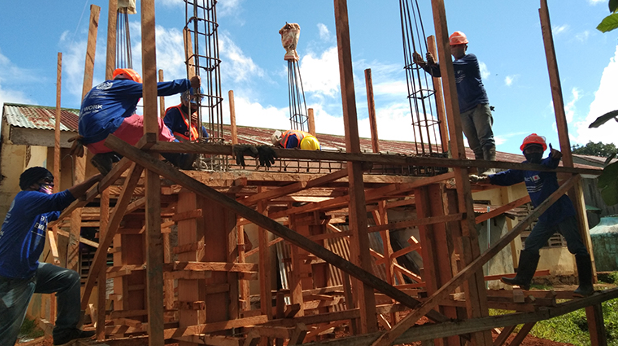|
Clean water for life and livelihoods amid pandemic
The COVID-19 pandemic has increased the need for clean water to prevent infection, while making it more difficult for some remote and vulnerable communities to access supplies. In the Philippines, an ILO-Japan project is developing better water supply systems, providing local jobs and promoting safe and healthy working conditions.
Just a few months ago Anelie Salazar was selling rice cakes in schools and washing clothes to help support her family. Antonio, her 46-year old husband is a coconut farmer and motorcycle driver and they have three school-age children. Every day, the 41-year-old mother would walk a kilometre to the nearest source of clean water, to complement the gallon of distilled water they bought for US$4.
“They supply water at the kids’ school but not always enough for the entire community, so I collect rainwater. It is not safe to drink after running off dirty surfaces and my container also gets murky and muddy with prolonged rainfall, but I have no choice,” said Salazar, adding that her children had been sick with fever and diarrhoea after they drank water from a bucket.
That was before the COVID-19 pandemic hit their community. Anelie Salazar“Life is more difficult now. My husband and I have lost our income because of the COVID-19, and we are barely surviving. We don’t have money to buy clean water for handwashing and drinking, let alone buying facemasks and hand sanitizers,” she said.
COVID-19 has exposed the challenges and inequalities that affect communities like Salazar’s, in the Bangsamoro Autonomous Region in Muslim Mindanao (BARMM). In this area, which for many years was blighted by armed conflict, many poor families rely on unprotected and contaminated water supplies, which leave them vulnerable to water-borne diseases. According to the Philippine Statistical Authority, in 2019 a quarter of families in the region did not have access to clean water.
Safe water and decent work
In 2019, the International Labour Organization (ILO), with the support of the government of Japan and in collaboration with the local government of South Upi, the TCES Parent-Teacher Association and the Ministry of Labor and Employment (MOLE), launched a project to improve water supply and sanitation services while at the same time promoting decent jobs.
The project engages former combatants and vulnerable groups, such as indigenous peoples, women, youth, and persons with disabilities. It’s intended that around 12,000 local households benefit from the project.
Salazar and her husband were among those hired to build the new water facility, located at their children’s school. The new system would benefit their own home as well as nearby communities.
But before they could start, construction of the tank was halted by the COVID-19 outbreak.
“We were in quarantine for three weeks. Only those with special passes were allowed to leave their homes. All stores were closed and we couldn’t buy construction materials to continue the work,” explains Arturo Maghanoy, President of the TCES Parent-Teacher Association.
Building back better and safer
Today, after a risk assessment, half of the workers are now back, working on the water facilities. They observe physical distancing and occupational safety and health protocols based on ILO guidelines for Safe Return to Work during COVID-19 .
Anelie and her husband have also returned to work on the construction site. She hopes that the children will have water for drinking and handwashing when school resumes in October. Her children will be among the 1,400 students who will go back, since online classes are not an option for them.
“We don’t have access to internet, my children and I don’t even know how to use a computer. The money we will earn from the construction project will help us put food on the table for our family,” said Salazar.
“The ILO’s contributions help promote peace in post-conflict areas whilst reducing poverty with job creations and improving living conditions through adequate water supply, sanitation and hygiene facilities,” said Khalid Hassan, Director of the ILO Country Office for the Philippines.
|



